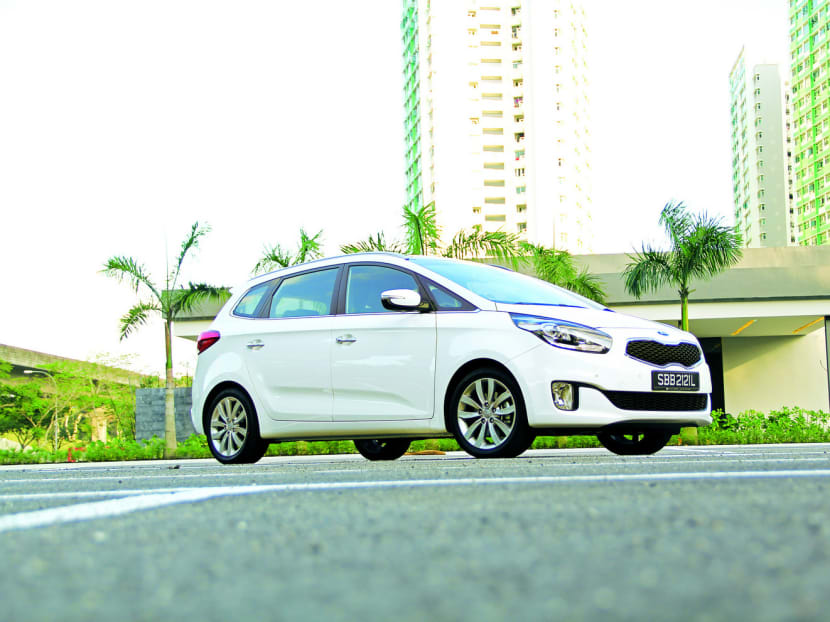A new kind of investment vehicle
SINGAPORE — Financially savvy people often say you should let your money work for you, but can your car do the same? One property agent here is using his Kia Carens that way, by making use of a financing scheme that can turn cars into income-generating assets.

Cycle & Carriage offers Private-Hire Purchase financing for Citroen, Kia and Mitsubishi cars. Photo: BIG FISH
SINGAPORE — Financially savvy people often say you should let your money work for you, but can your car do the same? One property agent here is using his Kia Carens that way, by making use of a financing scheme that can turn cars into income-generating assets.
The agent (who did not wish to be named) occasionally uses his Kia as an Uber taxi.
“Let’s say I have a property viewing at 2pm. I can pick up some passengers on the way. It’s a free trip for me. It subsidises my trip and business costs,” he said.
In fact, just two or three such journeys in a day are enough for him to cover the daily cost of paying for the Kia, which he bought in July. “Among my friends, it’s quite common. We’re always looking for additional sources of income,” said the agent.
SPECIAL-PURPOSE VEHICLE
To do this legally, the property agent bought his car from Cycle & Carriage (C&C) under a Private-Hire Purchase (PHP) scheme.
In normal vehicle financing, buyers eventually own their cars after paying off the vehicle loan, but with PHP, things are slightly different: The car belongs to a company specifically set up to own it, and the customer owns the company.
The finance company, in this case Goldbell Financial Services, loans the company the money to buy the car.
C&C makes PHP financing available for Citroen, Kia and Mitsubishi cars, but is not the only player in town with such a scheme on offer.
Motorway SsangYong has a similar option for buyers of SsangYong Tivoli models, too. It has its own financing arm to extend the necessary loans.
Both companies say they help customers with all the paperwork, including those needed to register the company.
A spokesperson for C&C said that PHP financing is best suited to people who have flexible working hours, like insurance or housing agents, freelance workers and housewives.
The take-up rate has been “encouraging”, said the C&C spokesperson. “We see a growing interest in people wanting to be a private-hire car driver,” said the spokesperson.
SKIRTING THE RULES
But PHP financing may not only draw buyers who want to be private-hire drivers, because it is not subject to the same restrictions that apply to personal vehicle loans.
Ordinarily, car buyers have to place a minimum down payment of 30 to 40 per cent of a car’s price, and repay the balance over a maximum of seven years. At C&C and Motorway, the minimum downpayment under PHP financing is just 10 per cent. The rest can be stretched out over 10 years.
This makes PHP financing a more accessible option, due to the lower downpayment requirements.
A Kia K3 Forte EX from C&C costs S$95,999 with COE, for example. A normal loan would require a down payment of S$28,800, while the PHP scheme lets a person put down S$9,600 for the car.
The spokesperson from C&C said the company discourages customers from circumventing financial regulations, and adds that Goldbell assesses the creditworthiness of all loan applicants to screen out those in danger of overstretching themselves financially.
Yet, there are other factors to consider. Insurance for cars used as private-hire vehicles is more costly than for normal cars, while the interest rates charged on the loans can be significantly higher.
Neither C&C nor Motorway would divulge interest rates, but examples of current deals on offer show that buyers who stick to traditional vehicle financing tend to enjoy cheaper loans.
A Kia K3 Forte bought with a conventional loan costs S$945 a month for seven years, but under PHP financing the monthly payment is S$1,007 for 10 years. That implies an interest rate of 3.98 per cent for the latter, versus 2.58 per cent for the normal loan.
Likewise, a SsangYong Tivoli XLV, which lists for S$126,888 with COE, can be financed for a S$12,688 downpayment and S$1,331 a month. That works out to a hefty S$45,640 in total interest payments over 10 years, which implies an interest rate of 3.98 per cent.
For all that, a PHP scheme can make sense under some circumstances. At S$1,007 a month, a Kia K3 costs around S$34 a day to finance. The same car from Lion City Rentals, an Uber-linked company, costs S$68 a day to rent.
And to the target clientele, the ability to pick up Uber or Grab passengers for income is a “no-brainer”, said the property agent.
But there are broader benefits that the financially savvy can take advantage of. A normal car loan impacts the Total Debt Servicing Ratio that banks use to calculate a person’s ability to repay a housing loan while PHP financing does not, so a person could still finance a car without limiting his budget for a property purchase.
It also gives buyers a chance to take the money they would have used for a hefty down payment and invest it elsewhere, hopefully for a better return. It is this flexibility that ultimately drew the property agent to the scheme.
“For me it’s a way to do things more efficiently. I’m not really an Uber driver,” he said. “It’s just smarter to do it this way.”





